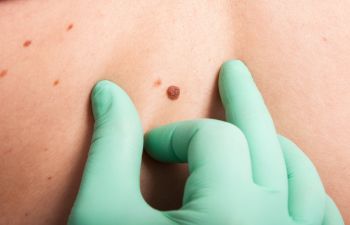
Often presenting as red, scaly patches, open sores or elevated growths, Squamous Cell Carcinoma (SCC) is the second most common form of skin cancer, as reported by the Skin Cancer Foundation. In fact, more than one million cases of SCCs are diagnosed each year in the United States. Long-term exposure to ultraviolet rays is mostly to blame, along with frequent exposure to indoor tanning beds.
Are You At Risk?
When it comes to skin cancer of any type, anyone with a history of sun exposure is at risk. However, SCCs are more commonly associated in those with fair skin, as well as those with blonde or red hair. Interestingly, while Squamous Cell Carcinomas mostly appear in individuals over the age of 50, more and more people in their 20s, 30s and 40s are being diagnosed. Again, experts believe that this is due to significant exposure to indoor tanning.
On the other hand, while SCCs are more likely to appear in fair-skinned individuals, recent data suggests a larger portion of African Americans and Latinos have been diagnosed. With this in mind, it’s important to understand that factors beyond skin color can put individuals at risk. For instance, skin injuries such as scars, burns, ulcers and sores that have been exposed to UV rays and chemicals (arsenic and petroleum by-products) can make one more susceptible to developing SCCs.
Moreover, individuals with a history of basal cell carcinoma, xeroderma pigmentosum (sensitivity to UV rays), immune deficiencies (HIV), as well as those having received an organ transplant and/or chemotherapy treatments are at risk. In turn, researchers believe that there is a genetic component to the development of Squamous Cell Carcinomas.
Given the above-mentioned risk factors and statistics relating to SCCs, individuals should remain vigilant if they notice a thick, rough, scaly patch on their skin that crusts or bleeds. They should also note if an open sore is not healing quickly, or if a sudden growth appears. While Squamous Cell Carcinoma may not be as threatening as other forms of skin cancer, they can become deadly if ignored.
At Kayal Dermatology & Skin Cancer Specialists, we believe that it’s essential to your recovery to have your symptoms checked as soon as possible. With extensive experience in the diagnosis of various forms of skin cancer, Dr. Kayal is a trusted and conscientious dermatologist serving Marietta and surrounding metro-Atlanta areas.
To schedule your appointment, call Kayal Dermatology today.
Posted on behalf of
141 Lacy Street, Suite 200
Marietta, GA 30060
Phone: (770) 426-7177
FAX: (770) 426-7745
Email: kayaldermatology@gmail.com
Mon-Fri: 7:30 am – 5:00 pm







